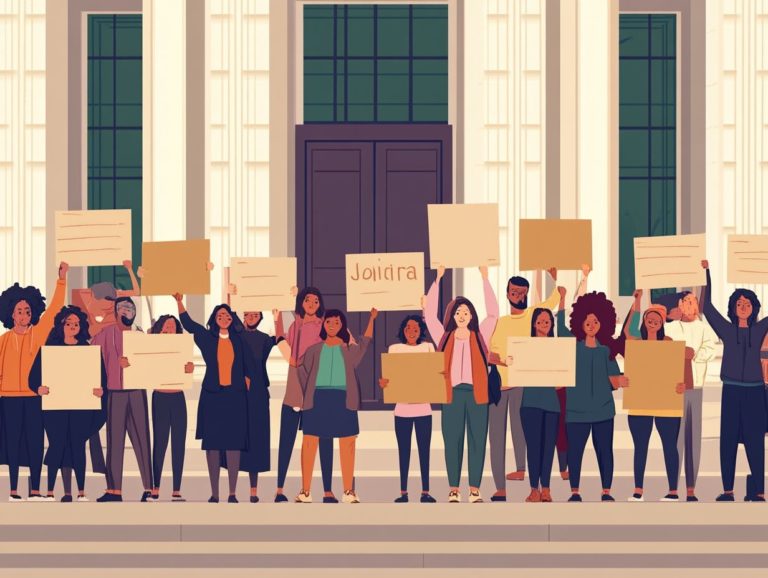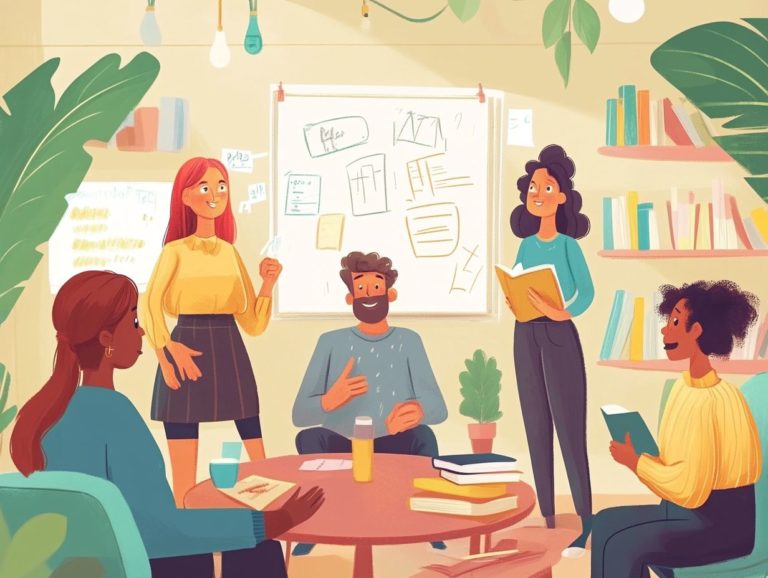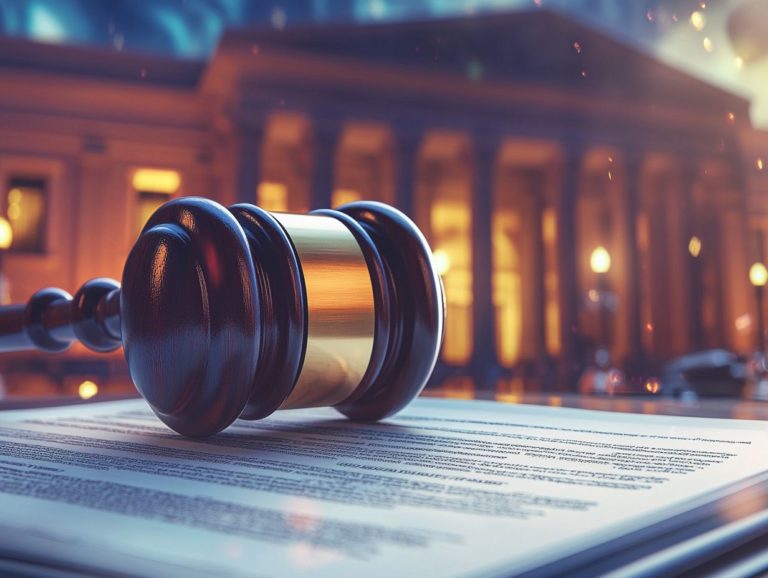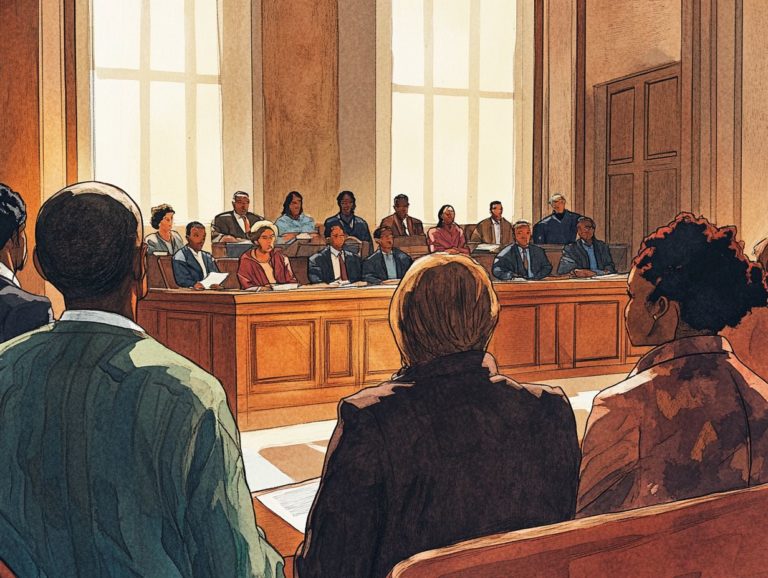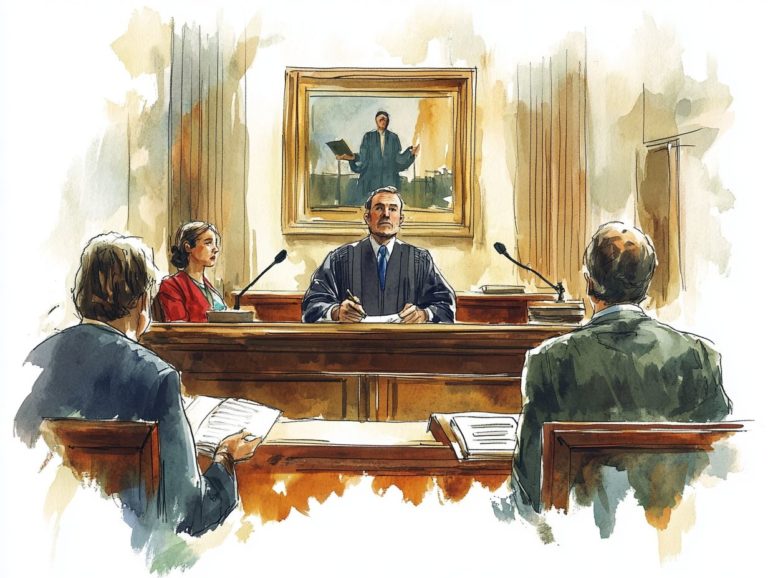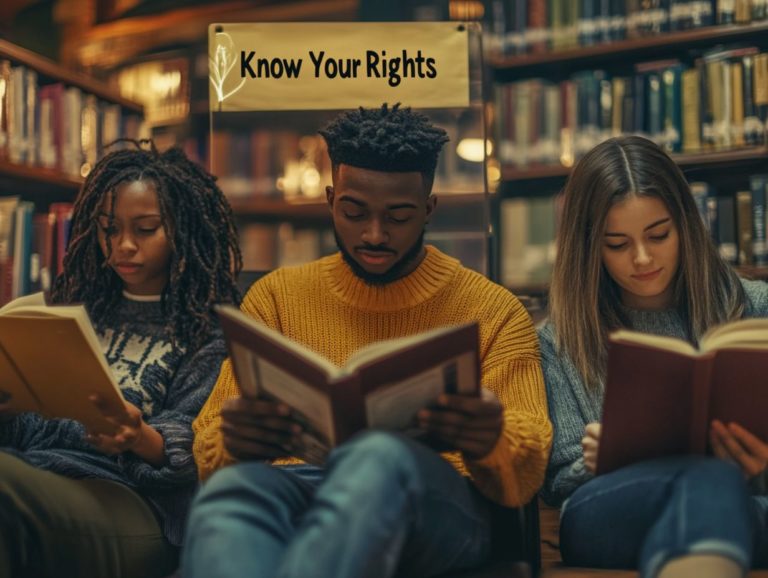7 Common Misconceptions About Your Rights
When you interact with law enforcement, understanding your rights can profoundly impact your experience.
Many individuals harbor misconceptions that may lead to misunderstandings and potentially jeopardize their safety.
Let s clear these misconceptions now so you can confidently protect your rights! This article delves into seven prevalent myths regarding your rights during police encounters covering everything from your right to remain silent to the necessity of warrants.
Contents
- Key Takeaways:
- 1. You Have the Right to Remain Silent
- 2. Your Rights Only Apply If You Are Arrested
- 3. The Police Need a Warrant to Search Your Property
- 4. You Can’t Be Charged with a Crime If the Police Didn’t Read You Your Rights
- 5. You Can’t Refuse a Search of Your Vehicle
- 6. You Can’t Be Arrested Without Probable Cause
- 7. You Have the Right to a Phone Call When Arrested
- What Are Your Rights When Interacting with the Police?
- What Are the Most Common Misconceptions About Your Rights?
- How Can Misconceptions About Your Rights Affect Your Interactions with Law Enforcement?
- What Are the Consequences of Not Knowing Your Rights?
- Frequently Asked Questions
Key Takeaways:
- You have the right to remain silent: This means you can choose not to answer questions from the police.
- Your constitutional rights apply at all times: Not just when you are arrested.
- The police can search your property without a warrant under certain circumstances: Be aware of your rights in various scenarios.
1. You Have the Right to Remain Silent
Every individual possesses the fundamental right to remain silent an essential aspect of the right to choose what happens to your body that protects against pressure and violations of rights within legal contexts.
This right serves as a vital safeguard, ensuring that law enforcement and state institutions cannot encroach upon personal liberties without consent.
International agreements like the Universal Declaration of Human Rights strengthen this right, particularly for marginalized communities who often navigate systemic pressures.
Advocacy raises awareness about the importance of consent in various situations. Discussions surrounding physical and emotional boundaries are deeply intertwined with the preservation of individual freedoms.
For instance, in matters of sexual consent, the right to remain silent reinforces that every person must have the autonomy to negotiate their own terms, further shielding them from potential violations.
2. Your Rights Only Apply If You Are Arrested
There’s a common misconception that rights like bodily autonomy and individual freedoms only come into play during arrest situations. This disregards the broader landscape of rights violations and legal barriers that can impact you even outside of law enforcement encounters.
These rights are essential in many aspects of daily life, affecting everything from your healthcare choices to workplace practices.
When you realize that your rights extend beyond just interactions with law enforcement, you become better equipped to advocate for yourself in medical environments or workplaces where discrimination might arise.
Advocacy efforts are vital in educating the public about these rights, tackling the pervasive legal barriers and social norms that often silence marginalized voices.
By raising awareness, organizations work to empower you, ensuring you recognize and claim your entitlements, ultimately paving the way for a more equitable society.
3. The Police Need a Warrant to Search Your Property
It s a fundamental principle of individual rights that law enforcement must secure a warrant to search your property. This protects your integrity and personal space from unwarranted intrusions.
This legal requirement upholds the sanctity of your physical domain and underscores a vital truth: you should maintain control over your personal and medical information.
In a world increasingly dominated by digital records, accessible health information illustrates the ongoing challenge of balancing public safety with individual privacy.
By requiring permission before conducting searches, this framework emphasizes the need to protect freedoms not just in physical spaces, but also in the management of health data.
Ensuring that both your integrity and health information remain secure is essential in cultivating a society that truly values personal autonomy and individual rights across every facet of life.
4. You Can’t Be Charged with a Crime If the Police Didn’t Read You Your Rights
Did you know your rights might not protect you the way you think? Many people mistakenly believe that not reading their rights means they’re immune to criminal charges.
This misconception about consent highlights the intricate nature of individual rights and legal protections within the realm of human rights. These misunderstandings can lead to serious consequences in legal proceedings.
They may lead you to wrongly assume that you re safe from prosecution, which could jeopardize your defense. This sort of ignorance complicates the judicial process and undermines the essential principles of justice and equality designed to protect every citizen.
It’s vital to raise awareness about these nuances. Making informed choices and actively advocating for oneself can significantly improve public understanding of rights.
Efforts to simplify legal jargon and processes are crucial, enabling you to navigate the complexities of your legal situation without misconceptions clouding your judgment.
5. You Can’t Refuse a Search of Your Vehicle
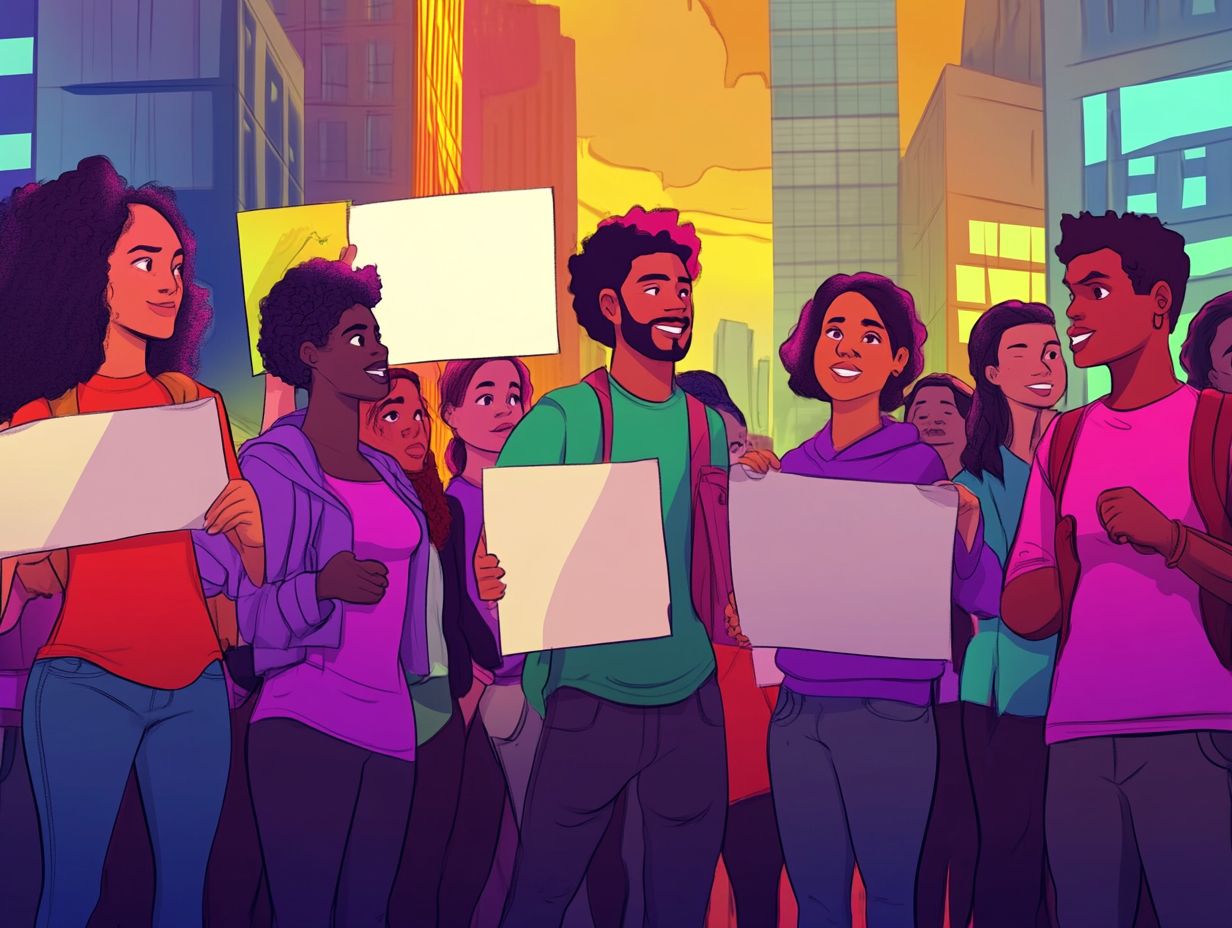
There’s a common misconception that you cannot refuse a vehicle search. This prompts important questions about legal boundaries and potential violations of your rights, challenging individual freedoms and the conversation around consent during law enforcement encounters.
In truth, the legal landscape surrounding vehicle searches is quite complex. You often have the right to refuse a search if law enforcement does not possess a good reason for believing you committed a crime or a warrant.
Many people may be unaware of these rights, which can lead to situations where consent is either misinterpreted or coerced. By grasping the criteria under which a search can be conducted such as the significance of consent, urgent situations, and probable cause you can navigate these encounters with greater confidence.
This highlights the vital importance of being well-informed about your rights. Understanding your rights is necessary in the broader context of personal freedoms and privacy in society.
6. You Can’t Be Arrested Without Probable Cause
The principle that you cannot be arrested without probable cause is a cornerstone of legal protections that upholds your individual rights. It prevents arbitrary detentions and serves as a crucial safeguard for people who are at risk.
This essential legal standard ensures that law enforcement remains within its rightful boundaries. It reinforces the notion that you deserve fair treatment.
Advocacy groups play an essential role in this landscape. They tirelessly work to educate you about your rights and the legal standards designed to protect you while holding authorities accountable when those standards are breached.
Through campaigns and community outreach, these efforts raise awareness about probable cause. They underscore its profound impact on marginalized communities who often endure disproportionate scrutiny.
By amplifying these voices, advocates aim to foster a more equitable justice system that respects and preserves the rights of every individual, including you.
7. You Have the Right to a Phone Call When Arrested
The right to a phone call upon arrest is crucial for your safety and peace of mind. It ensures you have access to legal assistance and support.
This fundamental right allows you to notify family or legal representatives. It plays a crucial role in your psychological well-being.
Feeling isolated during the early stages of detention can heighten anxiety and distress. Therefore, the ability to communicate is essential in mitigating these effects.
Advocacy groups are passionately working to raise awareness about this right. They strive to establish clearer policies that enforce its practice across various jurisdictions.
By highlighting the importance of communication in fostering a healthier state of mind, these efforts aim to ensure that you are treated with dignity and respect throughout your legal processes.
What Are Your Rights When Interacting with the Police?
Understanding your rights when interacting with the police is essential for protecting your rights and ensuring that legal protections are upheld. This knowledge helps you avoid potential violations that can arise from misunderstandings during law enforcement encounters.
A comprehensive grasp of your rights serves as a protective measure and helps you advocate for yourself within your community. Educating yourself empowers you to engage confidently in discussions about proper conduct during traffic stops, arrests, and searches. This creates an environment where you and others feel confident standing up for your dignity.
The conversation around consent is particularly crucial in these interactions. Knowing when consent is necessary and how it can be granted or revoked significantly impacts the legality and outcomes of your encounters with the police.
A solid understanding of these principles can help diffuse conflicts and shield you from unwarranted searches or unnecessary escalations.
What Are the Most Common Misconceptions About Your Rights?
Common misconceptions about rights, especially concerning legal barriers and individual freedoms, can cause serious violations and misunderstandings during police encounters. This underscores the urgent need for better education on the subject.
Many individuals believe they have no recourse when confronted by law enforcement or that their rights vanish in those moments. This misunderstanding fosters passivity and can compromise their freedoms.
For example, the myth that one must always consent to a search can lead to unjust invasions of privacy. Many also wrongly assume that not knowing the law can excuse their actions, further complicating legal encounters.
Accessible health information and community education initiatives are crucial for dispelling these myths. By enabling individuals with knowledge of their rights, they can navigate the complex legal landscape confidently.
How Can Misconceptions About Your Rights Affect Your Interactions with Law Enforcement?
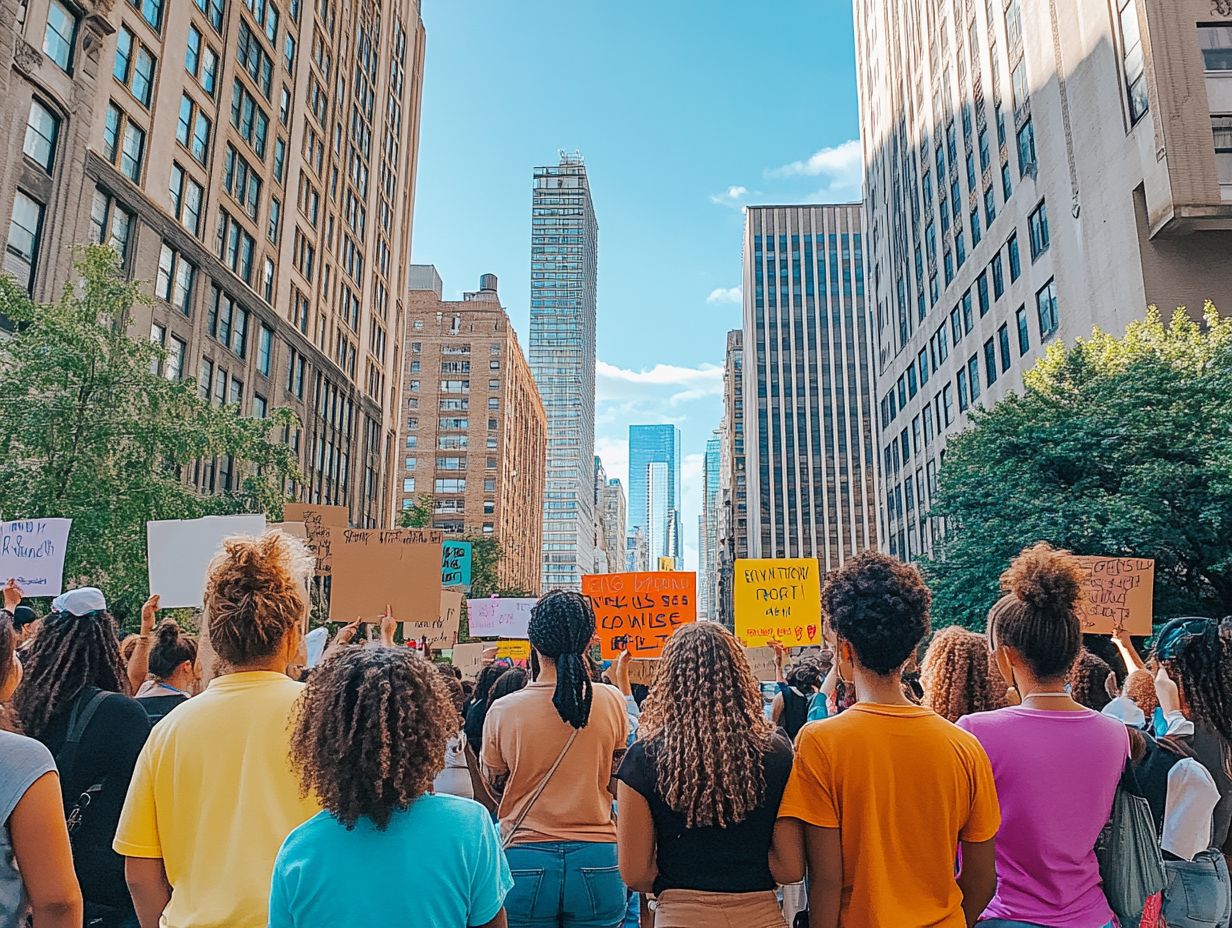
Misconceptions about your rights can profoundly impact your interactions with law enforcement, often resulting in violations that reinforce social barriers and diminish your individual rights and freedoms.
These misunderstandings typically arise from a lack of awareness or misinformation, leaving you unprepared to assert your rights during confrontations. If you don t recognize your right to remain silent or to request an attorney, you might inadvertently jeopardize your legal standing.
This oversight can lead to unjust outcomes, such as wrongful arrests or extended detentions. Advocacy efforts are essential in addressing these challenges. By educating the public about their rights and fostering a culture of awareness, organizations can help dismantle these misconceptions.
This empowerment enables individuals to engage more effectively with law enforcement, ensuring that their rights are upheld and respected.
What Are the Consequences of Not Knowing Your Rights?
Not knowing your rights can lead to serious consequences, leaving you vulnerable to rights violations and feeling powerless during crucial interactions with law enforcement.
You may find yourself at a disadvantage, facing unjust treatment or even legal repercussions simply because you weren t aware of your entitlements. Don t let a lack of knowledge put you at risk! Knowing your rights is crucial for standing up for yourself.
The absence of awareness can perpetuate systemic injustices, particularly affecting marginalized communities. Educating yourself about these rights is essential for fostering a society where advocacy flourishes and conversations around consent and dignity take precedence.
By equipping yourself with this knowledge, you can confidently navigate the complexities of the legal landscape.
Learn more about your rights and share this information with others to empower your community!
How Can You Educate Yourself on Your Rights?
Educating yourself about your rights is crucial for ensuring that your individual freedoms are respected. This can be accomplished through accessible health information, community resources, and advocacy efforts.
To embark on this enlightening journey, start by tapping into online platforms that offer a wealth of information, including educational websites and webinars focused on rights awareness.
Participating in workshops hosted by local organizations can also be beneficial. These events aim to empower individuals through knowledge. Community programs provide hands-on experiences, allowing you to connect with others and share insights.
Getting involved in grassroots efforts can boost your understanding and highlight the essential role of advocacy in sharing important information. By doing so, you ensure that everyone has the opportunity to learn about their rights.
What Are Some Resources for Understanding Your Rights?
Many resources are available to help illuminate your rights, ranging from online platforms to community organizations dedicated to advocacy and accessible health information.
For instance, websites like Know Your Rights and the ACLU offer invaluable insights tailored to various legal issues. Organizations such as the Legal Aid Society provide free legal consultations for those in need.
Community workshops are another excellent avenue for educating residents on vital topics and fostering a supportive environment where you can ask questions and gain clarity about your rights.
These initiatives do more than just inform; they enable you to advocate for yourself and navigate the often complex legal landscape with confidence.
Frequently Asked Questions
What are some common misconceptions about our rights?
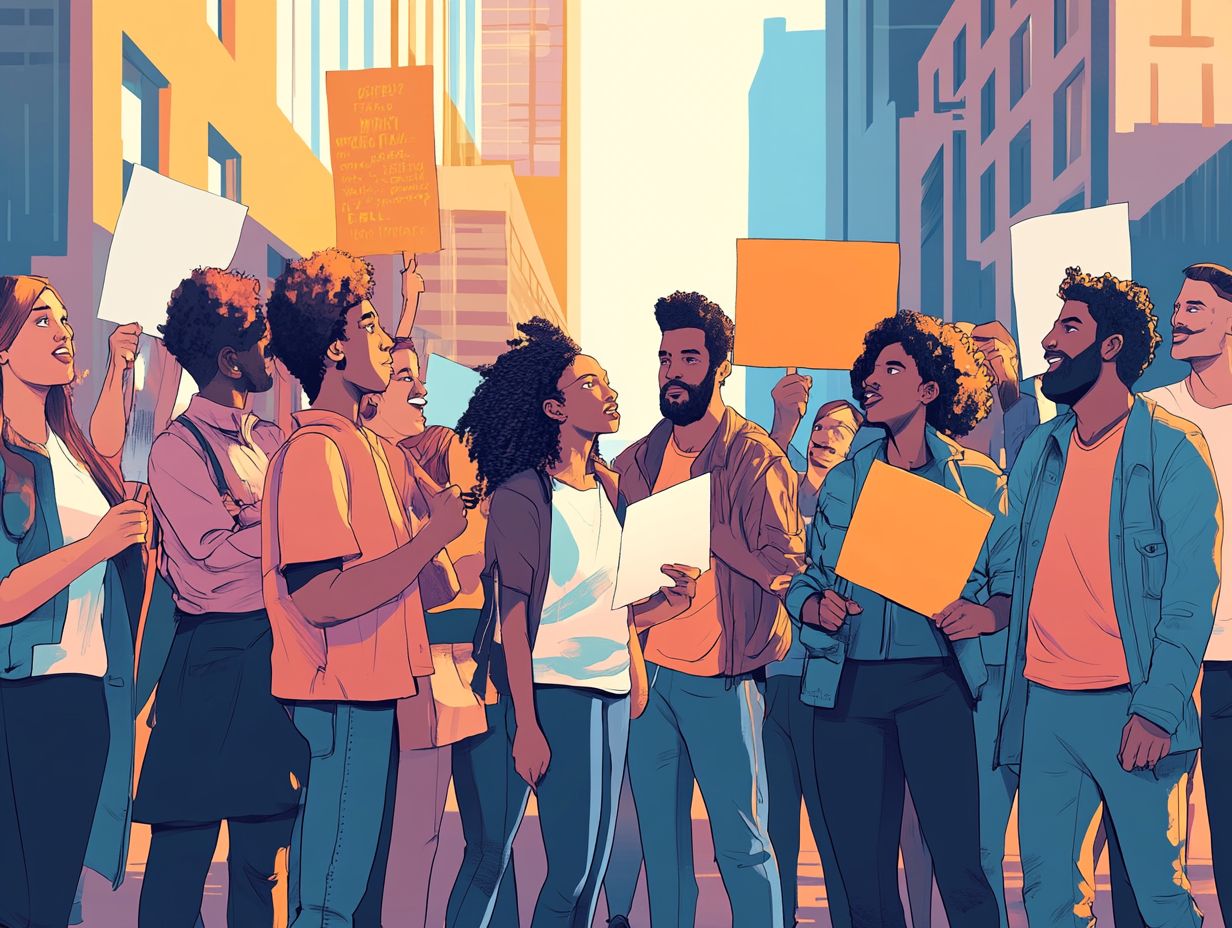
Some common misconceptions include:
- Thinking that our rights are absolute and cannot be limited.
- Believing that our rights are only protected by the government.
- Assuming that we can do whatever we want without consequences.
Are our rights guaranteed at all times?
No, our rights are not guaranteed at all times. While we have certain rights protected by law, they can be limited in specific situations, such as during a state of emergency or to protect the rights of others.
Do we have the right to say anything we want?
While we have the right to freedom of speech, this right is not absolute. We cannot use our words to incite violence or harm others, and there are consequences for hate speech and defamation.
Is the government the only entity responsible for protecting our rights?
While the government plays a crucial role in protecting our rights, we also have a responsibility to educate ourselves about our rights and advocate for them. We can seek protection from non-governmental organizations and the justice system as well.
Can our rights be taken away?
Our rights can be limited or taken away in certain situations, such as during a state of emergency or if we are convicted of a crime. However, these limitations must be justified and follow due process of law.
Do we have the right to privacy at all times?
While we have the right to privacy, it is not absolute. Our privacy may be limited in certain situations, such as for national security reasons or if there is a reasonable suspicion of criminal activity.
Start exploring these resources today to empower yourself!

